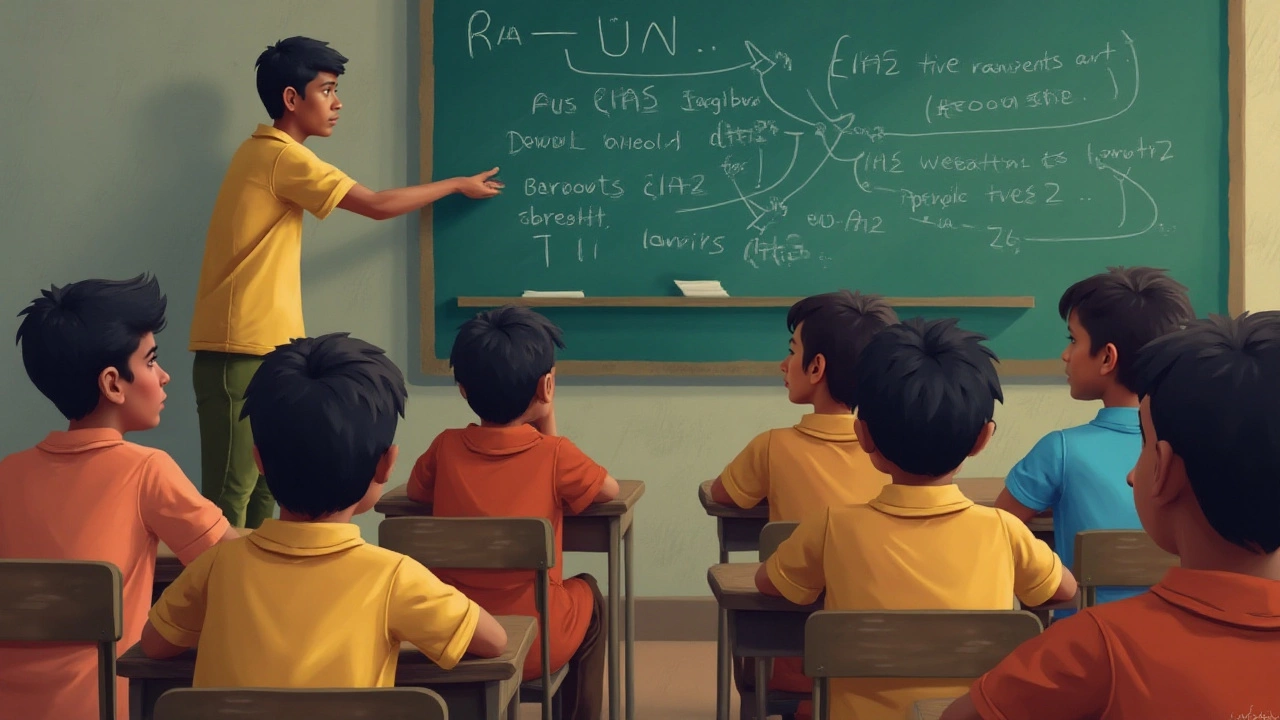When it comes to competitive exams, the stakes often feel sky-high. Many aspire to excel, hoping to secure a place in illustrious institutions or land dream jobs. However, beneath the surface of this pursuit lies a potential for significant stress and anxiety.
Competition might drive some to thrive, but it's crucial to recognize the potential downsides. The weight of expectations can lead to burnout, affect mental health, and skew priorities away from genuine learning. It's vital to be aware of these challenges in order to maintain not just academic success, but also personal well-being.
- The Nature of Competition in Exams
- Mental Health Implications
- Impact on Personal Growth and Relationships
- The Pressure to Constantly Perform
- Finding a Balance: Healthy Competition
The Nature of Competition in Exams
In many educational systems around the world, the role of competitive exams is pivotal, serving as the gatekeepers to higher education opportunities and lucrative careers. These exams are designed to meticulously assess a student's knowledge, analytical skills, and problem-solving abilities under pressure. In countries like India and China, the significance of exams such as the IIT-JEE and the Gaokao cannot be overstated. Here, academic achievement is often seen as a reflection of personal worth, which can create a culture driven by intense rivalry. Such systems can push young minds to their limits, fostering a mentality where success is defined by surpassing others.
While the intention is to motivate students to achieve their best, this form of rivalry can, at times, overshadow the essence of true learning. The educational journey should ideally be about exploration and passion-driven learning, but when competition takes the center stage, the pure joy of acquiring knowledge may take a backseat. This environment can compel students to prioritize performance over understanding, leading them to employ rote memorization techniques just to remain competitive. In an attempt to stay ahead, many might even resort to unfair means, further corrupting the integrity of the learning process.
The Origins of Competitive Exams
The lineage of competitive exams can be traced back to ancient China, where the Imperial Examination was established during the Han dynasty. This system was designed to select capable candidates for governmental positions based on merit rather than family status. Joseph Needham, a renowned academic who studied Chinese history, noted, "The civil service examination was the world's first major use of written exams for public selection." This historical aspect highlights that exams were initially tools of egalitarian advancement. However, as time evolved, the approach and perceptions surrounding these evaluations have changed dramatically, especially as competition increased exponentially with the global population growth.
Today, such exams often emphasize ranking systems, pitting students against each other in a bid to secure the top spots. This environment can foster a zero-sum game mentality, where one's gain is perceived as another's loss. This notion becomes more ingrained as technology and globalization bring students from varied backgrounds together in fiercely contested arenas. The examination process, once intended to democratize education, now sometimes amplifies socioeconomic disparities, as those with more resources can afford better preparation tools and tutoring, giving them a potential edge over less fortunate peers.
Understanding the Psychological Aspects
Underpinning these competitive dynamics is the psychological pressure that often accompanies them. Human beings are innately wired to compete; it is engrained in our social fabric. Yet, this instinct, when attached to education and learning, can produce harmful stress levels, especially among younger students who are still developing resilience tools. The constant striving to outperform friends and classmates can lead to a build-up of anxiety, which might interfere with mental clarity and cognitive function. This situation not only hampers the educational process but can also significantly affect emotional health and personal growth.
Given these consequences, educators and policymakers must consider ways to nurture a more balanced approach. This might involve promoting collaborative learning alongside competitive aspects, reassuring students that true success is personal growth and knowledge acquisition rather than just scores and rankings. By understanding the competitive nature of exams deeply, we can foster an educational environment that values holistic learning. In doing so, maybe we can rekindle the spark of curiosity that originally inspired the journey of education.
Mental Health Implications
The constant drive to exceed in competitive exams can significantly affect a person's mental health. The pressure to constantly perform well and maintain a high level of achievement induces stress, which can manifest in several ways. For many, the anxiety becomes crippling, making it difficult to focus on the task at hand. Sleepless nights and the constant worry of falling behind peers add to this burden, creating an environment where students are perpetually on edge.
In some cases, this pressure leads to issues such as depression and burnout. Depression may arise from a perceived failure to meet one's own expectations or those set by parents and educators. Burnout happens when the stress becomes so overwhelming that it drains a person's physical and emotional resources. This leads to a lack of motivation or even a sense of apathy toward academic goals.
Research shows that the high demands of such exams can impair cognitive functions, including memory, concentration, and problem-solving abilities. These are crucial for success, yet ironically, they're the very capabilities that are diminished under toxic stress levels. Though students might start with enthusiasm and determination, chronic stress can erode these qualities, making it hard to sustain effort over time.
Psychologists note that competitive environments often discourage collaborative learning, an approach known to enhance understanding and retention. When peers turn into competitors, the shared experience of learning takes a backseat, isolating individuals who might benefit from mutual support. The constant comparison with others fuels insecurity, leading some students to develop a negative self-image.
"Excessive competition can create a toxic learning atmosphere where students are more focused on outperforming each other than on learning," says Dr. Emma Carter, a psychologist specializing in adolescent stress.
The implications for mental well-being are profound. Constant exposure to competitive settings without adequate coping mechanisms can exacerbate the situation, making students less resilient to future challenges. It's crucial to recognize the signs of stress and address them proactively to mitigate long-term psychological effects. Schools and parents must cultivate environments that balance ambition with encouragement, offering support systems where students feel valued beyond their academic performances.

Impact on Personal Growth and Relationships
Being extraordinarily competitive in the setting of exams can significantly shape personal growth and relationships, often in ways individuals might not initially anticipate. The nature of competitive environments typically cultivates a mindset where one equates self-worth with academic achievement. This in turn can lead individuals to evaluate their success by comparing scores and ranks rather than focusing what they have learned or the skills they have developed. When this becomes a constant pattern, there is a risk of neglecting other facets that contribute to a rich and rounded individual growth experience, such as emotional intelligence, creativity, and the ability to work collaboratively.
The drive for top performance can push students into a cycle where they isolate themselves, dedicating every moment to study. This potentially erodes important social interactions and connections, leading to feelings of loneliness. Friendships may fall by the wayside as competitors turn into rivals, slowly eroding their previous support networks. These dynamics can also spill over into family life, where pressure mounts not only from external surroundings but often from within the walls of home. Parents may inadvertently emphasize results over effort, creating a family atmosphere dominated by tension.
According to psychologist Carol Dweck, author of Mindset: The New Psychology of Success, "...the view you adopt for yourself profoundly affects the way you lead your life. It can determine whether you become the person you want to be and whether you accomplish the things you value."
In such settings, it's not uncommon for communication barriers to form. Students may feel estranged from the people they are closest to, as the constant emphasis on success can overshadow deeper, meaningful conversations. The typical student-investor relationship with parents, where success translates into financial rewards or incentives, might overshadow dialogues about emotions or aspirations beyond high scores. People involved may inadvertently prioritize outcomes over processes, which isn't sustainable in relationships built on trust and mutual respect.
Statistical studies have highlighted that among high school and college students involved in intense competitive exams, a significant percentage express feelings of reduced self-esteem when they do not meet their competition goals. A hypothetical table of impactful stats might read as follows:
| Factor | Percentage of Impacted Students |
|---|---|
| Negative Self-esteem | 45% |
| Strained Family Relations | 38% |
| Loss of Interest in Hobbies | 50% |
Additionally, the pursuit of academic success as the single defining element of one’s identity can inadvertently stifle curiosity and hinder the exploration of other interests. When everything circles around outshining peers academically, there often remains little room for hobbies or pastimes that nurture creativity or provide relaxation. This restricted focus not only limits self-exploration but can also create larger barriers to resilience building, since all of one's sense of self-esteem becomes tied to a narrow definition of success.
The Pressure to Constantly Perform
For many students, the world of competitive exams feels like a relentless hamster wheel, spinning without respite. The pressure to constantly perform at their peak can be overwhelming. This unyielding expectation often stems not just from self-imposed standards, but also from external sources such as parents, teachers, and peers. Statistics have shown that high school students today are more engaged in academic pressures than ever before, with a notable surge in anxiety levels reported among adolescents preparing for exams like the SATs or GREs. This constant need to outdo others, and sometimes oneself, creates an environment where mental and emotional health can suffer as a direct consequence.
The competitive landscape in education has bred a culture where students frequently equate their self-worth with their academic performance. This association can lead to a vicious cycle where poor outcomes breed anxiety, which in turn hampers future performance. The Chronicle of Higher Education points out that students often feel caught in an upward spiral of expectations, concluding that 'the more you achieve, the more is expected of you.' This dynamic can rob the joy of learning, replacing it with a fear of failure. Studying becomes a means to an end, defined strictly by grades and ranks, rather than by acquiring meaningful knowledge and skills.
Yet, success in competitive exams isn't just about raw scores; it also involves social comparison. Students may perceive their peers as rivals, leading to unhealthy competitions and strained relationships. School settings often exacerbate this by publicly celebrating top performers, creating an environment where being second best feels akin to failure. This atmosphere can put a strain on friendships and create a pervasive sense of isolation, as everyone is viewed through the lens of academic capability rather than personal character or other interests.
Such pressures can also drive students to extreme measures to secure their 'rightful' place atop the academic leaderboard. Sleepless nights, skipped meals, and an over-reliance on caffeine and other stimulants become common as exam dates loom closer. In some cases, the competition’s intensity might push students towards academic dishonesty as a desperate attempt to maintain their standing. These strategies, however, are merely short-term fixes that could have long-term repercussions not only on their health but also on their ethics and integrity. Harvard studies suggest that sustained high levels of academic stress can lead to depression, affecting a student’s overall quality of life significantly.
Ultimately, the continuous call to perform at maximum capacity can overshadow the real purpose of education: fostering a lifelong passion for learning and developing critical thinking skills. Parents and educators need to be mindful of the messages they are sending about success and failure. Addressing this competitive culture involves encouraging a more holistic approach to learning, one that values creativity, collaboration, and intellectual curiosity as much as grades and accolades. It’s essential for students to navigate their educational journeys not as a series of hurdles but as opportunities for exploration and growth.

Finding a Balance: Healthy Competition
In the pursuit of academic excellence through competitive exams, it's all too easy to get swept away by the whirlwind of pressure and expectations. However, finding a healthy balance can transform competition from a source of stress to an enriching and motivating experience. A balanced approach to competition not only highlights the positives of ambition and perseverance but also underscores the importance of enjoying the learning journey. Take, for instance, the practice of mindfulness and stress-reduction techniques that are recommended by mental health experts worldwide. These practices enable students to center themselves, manage anxiety, and approach studies with a calm and focused mind.
It's crucial to remember that healthy competition is not about incessantly comparing yourself to others, but about striving to be the best version of yourself. By setting personal goals, you encourage growth and innovation while maintaining mental and emotional well-being. Strategic planning also plays a pivotal role in achieving a harmonious competitive spirit. Creating a study schedule that accommodates rest and recreational activities ensures you stay refreshed and motivated. An interesting insight is provided by a study from the American Psychological Association which indicates that students who balance study with leisure activities tend to perform better academically.
Building a support network of peers and mentors can further enhance healthy competition. When students engage collaboratively, they share resources, knowledge, and encouragement. This collective growth mindset shifts the focus from rivalry to shared success, fostering an environment where everyone can thrive. Consider starting a study group where members exchange ideas and provide constructive feedback, reinforcing the learning process. Connecting with others who share your ambitions can fuel your passion while also softening the harsh edges of competition. As Steve Jobs once articulated,
Competition is not always the problem. It is often part of the solution.A strong support system embodies this by converting rivals into allies.
Emphasizing internal over external validation is another key element of healthy competition. When you are driven by internal goals and values, you cultivate resilience, because your sense of worth isn't solely defined by external accolades. A growth-oriented mindset embraces failures as learning opportunities rather than setbacks. It is this mindset that often leads to true mastery and success. Encouraging such a perspective not only boosts confidence but also perpetuates a cycle of continuous learning and self-improvement. To effectively foster internal motivation, consider practices like journaling or reflective meditation, which help clarify personal intentions and celebrate small victories en route to larger goals.





Write a comment